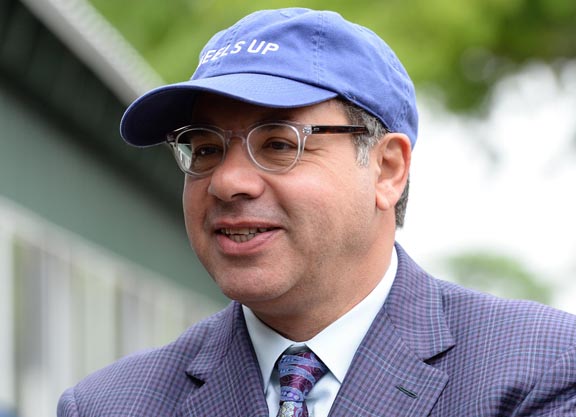By T. D. Thornton
Ahmed Zayat's former financial advisor is among the entities now initiating an “involuntary bankruptcy” petition against Zayat's family-owned racing stable. This Sept. 14 court action comes six days after the allegedly insolvent Triple Crown-winning breeder and owner voluntarily filed for his own personal Chapter 7 bankruptcy protection.
Although once prevalent, involuntary bankruptcy proceedings are now relatively uncommon in United States courts. They are designed to protect creditors, not debtors, and are often filed against companies (as opposed to individuals) as an attempt to get paid when it is believed that a firm is rapidly burning through assets and/or financial malfeasance is alleged.
Zayat Stables, LLC, is currently a defendant in a $23 million lawsuit filed in January by a New York lender alleging fraud and loan defaults. A Kentucky receiver is in the process of liquidating those equine assets.
Although it is unclear exactly what effect this attempt at “forced” bankruptcy might have on that case, one possible scenario is that the petitioners believe that the only way to preserve the remainder of the dwindling assets for distribution to them is to take legal action via an involuntary bankruptcy. They'd be banking on the bankruptcy order stopping the current liquidation from moving forward, which might keep others from getting paid first.
The Chapter 7 documents filed in U.S. Bankruptcy Court, District of New Jersey (Newark), on Monday allege that Zayat Stables owes $275,000 in loans “above the value of any lien” to Steven Keefer.
A 2003 New York Times story on Zayat's beverage business referred to Keefer as “a former New York investment banker and now chief of staff to Mr. Zayat” who was also head of the development group for the beverage firm.
Zayat apparently even named a Thoroughbred racehorse “Keefer” in honor of his business associate. The colt broke its maiden in 2008 at Monmouth Park in New Jersey, the home state for both men.
Keefer is now the chief executive officer at U.S. Elite, LLC, a New Jersey company that specializes in “tactical” apparel for fitness and military enthusiasts. According to Keefer's bio page on the company website, the firm's motto is “We exist to Enhance the Warrior Lifestyle.”
U.S. Elite itself is also listed as a petitioning creditor in the court documents, alleging $188,500 in loans owed by Zayat Stables.
A third party, Joseph Bodner, who lives in the same town (Teaneck) as Zayat, is listed in the petition as being owed $150,000 by the stable.
Under involuntary bankruptcy law, if a debtor has more than 12 creditors, three creditors must join in the involuntary petition for a “force” to move forward.
The claims total $613,500. All three amounts match what Zayat stated he owed those entities in his personal Chapter 7 filing last week.
The petitioners indicated via checking a box that “The debtor is generally not paying its debts as they become due, unless they are the subject of a bona fide dispute as to liability or amount.”
In his separate, voluntary petition for bankruptcy, Zayat is claiming $19,371,466 in total liabilities versus total estimated assets of $1,892,815.
Thoroughbred trainers, horse farms, bloodstock businesses, veterinarians, and equine transportation companies are among the 132 entities listed as creditors in Zayat's own Chapter 7 filing. They are due $14,755,1717 in “non-priority unsecured claims,” which means they are at the bottom of the hierarchy to get paid—if they get paid at all. Zayat Stables is listed as a co-debtor to 112 of those 132 non-priority unsecured claims.
The next step in the involuntary petition is for Zayat Stables to file a response. If the debtor contests an involuntary petition, the petitioning creditor must prove that the debtor is generally not paying its debts.
If the petitioners are successful, the bankruptcy court will enter an “order for relief” granting the involuntary petition.
But if the court dismisses the petition, the creditors might be on the hook for paying Zayat Stables' attorney fees and court costs. In addition, if the court rules that the petition was made in bad faith, it can award compensatory and even punitive damages.
Involuntary bankruptcies can be complicated and fraught with peril for both sides. Nicholas Gebelt, an attorney who writes on the subject as a California-certified bankruptcy specialist, described the process like this on his law blog:
“On a practical level, the most compelling reason for filing an involuntary bankruptcy against a debtor is the fear that the debtor is rapidly depleting the resources available to pay its creditors. [But] filing an involuntary bankruptcy against someone is very dangerous. If you are a creditor who files an involuntary bankruptcy against a debtor, then if you can't establish one of the two grounds for relief…you may find yourself paying the very entity from whom you're trying to collect. Therefore, absent compelling exigent circumstances it is probably safer to use some other approach to debt collection.”
Not a subscriber? Click here to sign up for the daily PDF or alerts.






